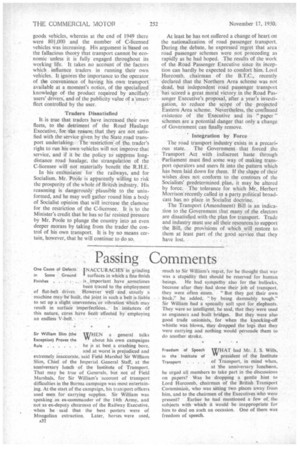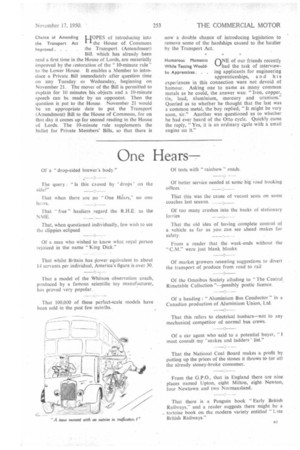Passing Comments
Page 34

Page 35

If you've noticed an error in this article please click here to report it so we can fix it.
One Cause of Defects INACCURACIES in grinding
in Some Ground A surfaces in which a fine finish Finishes . is, important have sometimes . , . been traced to the employment of flat-belt drives. However well and stoutly a machine may be built, the joint in such a belt is liable to set up a slight unevenness or vibration which may result in surfaee imperfections.; In instances or this nature, cares have been -effected by' employing
an endless V-belt..
Sir William Slim (the WHEN a general talks Exception) Proves the " about his own campaigns Rule he is at best a crashing bore,
and at worst'is prejudiced and extremely inaccurate, said Field Marshal Sir William Slim, Chief of the Imperial General Staff, at the anniversary lunch of the Institute of Transport. That may be true of Generals, but not of Field Marshals, for Sir William's account of transport difficulties in the Burma campaign was most entertaining. At the start of the campaign, his transport officers used men for carrying supplies. Sir William was speaking as ex-commander of the 14th Army, and not as.ex-deputy chairman of the Railway Executive, when he said that the best porters were of Mongolian extraction. Later, horses were used, A32 'much to Sir William's regi et, for he thought that war was a stupidity that should be reserved for human
beings. He had syrinpathy also for the bullocks, because after they had ,done their job of transport, They were often eaten. • "But they got their own back," he added, "by being damnably tough." .Sir William had a specially soft spot for elephants. They were so intelligent, he said, that they were used as engineeis and built bridges. But they were also good trade unionists,, for when the knocking-off whistle was blown, they dropped the log; that they were carrying and nothing would persuade them to do another stroke.
* • * Freedom of Speech WHAT had Mr. J. S. Wills, In the Institute of " president of the Institute Transport . . . of Transport, in mind when, at the anniversary luncheon, he urged all members to take part in the discussions on papers? Was be dropping a gentle hint to Lord Hurcomb, chairman of the British Transport Commission, who was sitting two places away from him, and to the chairmen of the Executives who were present? Earlier he had mentioned a few of. the subjects with which it would be inappropriate for him to deal on such an occasion. One of them was freedom of speech.
Chance of Amending the Transport Act Improved . . .
HOPES of introducing into the House of Commons the Transport (Amendment) Bill, which has already been read a first time in the House of Lords, are materially improved by the / estoration of the " 10-minute rule" to the Lower House. It enables a Member to introduce a Private Bill immediately after question time on any Tuesday oi Wednesday, beginning on November 21. The mover of the Bill is permitted to explain for 10 minutes his objects and a 10-minute speech can bc made by an opponent. Then the question is put to the House. November 21 would be an appropriate date to put the Transport (Amendment) Bill to the House of Commons, for on that day it comes up for second reading in the House of Lords. The 10-minute rule supplements the ballot for Private Members' Bills, so that there is
now a double chance of introducing legislation to remove some of the hardships caused to the haulier by the Transport Act.
Humorous Moments rINE of our friends recently
While Testing Would'1/4-lhad the task of interviewbe Apprentices. . . jog applicants for engineering
apprenticeships, and his experiences in this connection were not devoid of humour. Asking one to name as many common metals as he could, the answer was: "Iron, copper, tin, lead, aluminium, mercury and uranium." Queried as to whether he thought that the last was a common metal, the boy replied, "It might be very soon, sir." Another was questioned as to whether he had ever heard of the Otto cycle. Quickly came the reply, "Yes, it is an ordinary cycle with a strait engine on it."




























































































